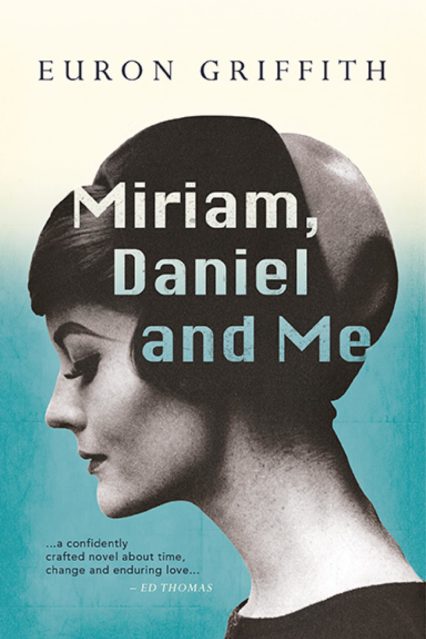Gemma Pearson reviews Euron Griffith’s debut English-language novel, Miriam, Daniel and Me, a story which intertwines family affairs with the political turmoil of the 1950s and 60s.
“You know our problem in Wales? We never conquered anyone. […] We sat here for centuries just twiddling our thumbs while the rest of the world trampled all over us, priding ourselves on surviving when, really, we should have gone on the land-grabbing rampage like everyone else.”
On the 1st of July 1969, the royal family descended on Caernarfon Castle and a young, fresh-faced Prince Charles was acknowledged as the Prince of Wales. Black and white television coverage showed crowds of people trying to catch a glimpse of the lavish ceremony, with Union Jacks and Y Ddraig Goch flying high in the hands of eager onlookers. But behind this cloak of grandeur a wave of unrest, culminating in protests and planned attacks, signified that a deep nationalist anger was swelling.
Framed by such issues of Welsh identity and the political turbulence of the 1950s and 60s, Euron Griffith’s latest novel – interestingly, the first to be written in English – is a rich family saga that glitters with a distinctly local nostalgia. Set in the village of Bethel in North-West Wales, Miriam, Daniel and Me explores how small decisions or deviations, seemingly insignificant at the time, prompted lasting change in the formation of the Meredith family. If Gladys, Daniel’s mother, had adhered to her wealthy family’s expectations for her marital partner, she would never have met John, a talented slate miner with a beautiful, hearty singing voice. If Miriam had stayed with her first love, a dashing Irishman named Padraig, she would have “become a Catholic and [had] lots and lots of children” and never have met Daniel. If Daniel hadn’t hit Miriam with his car (“the young girl […] seemed to be okay apart from a dirty coat and a shattered bag”) the two would never have met and the titular “Me” would never have been born. Examining the unique intricacies of lives that could have been and the life we end up living, Miriam, Daniel and Me is a moving portrait of love, chance, and the enlivening power of memory.
During Seren’s online book launch, Griffith explained that the central characters in the novel were inspired by his own family members. Because of this, the novel is infused with an intimate, autobiographical feel. What is more, because Griffith elects to tell the story through short vignette-style chapters and a non-linear narrative, Miriam, Daniel and Me reads like a series of anecdotes that piece together to paint a vivid picture of the family dynamic. A series of intriguing secondary characters also dip in and out of the novel. “Hoppy”, an ex-footballer who lost a leg during a WWII bombing, and “Moonglow”, a member of a hippy community near the village both have some level of impact on the lives of the protagonists and, therefore, gently remind us that we are all shaped by the people we meet.
Griffith’s preoccupation with the passage of time also leads to interesting meditations on the nature of tradition and social expectation. Griffith writes about the modesty of life in Bethel with fondness and discernment; the village’s mining history for instance is represented as a simple fact of life: “[John] would work in Orwig Quarry just as his father had done and as his grandfather had done before him.” However, change and advancement stand as key points of tension in this novel: “The new decade was just around the corner and the world was changing but clearly not for the better. Russia and America were at each other’s throats and chapel seemed irrelevant in the face of imminent destruction.” Thus, layered behind the story of the Meredith family themselves, Griffith offers an acute examination of how conflict can arise when convention meets change, progress meets stasis, or when tradition meets modernity.
Like the slate expertly cut by Daniel’s father at the quarry – “John Meredith could slice slate as thin as paper” – Miriam, Daniel and Me is slight but carefully crafted. Griffith’s talent for blending stories of the personal and the political is also undeniably powerful. Thus, sliding easily between people, places and timelines and covering an array of cultural topics such as Welsh language poetry, football, slate mining and religion, Griffith’s novel offers a moving, microcosmic insight into a society wrought with anxieties about Welsh identity.
Miriam, Daniel and Me by Euron Griffith is available now from Seren Books.
You might also like…
Carolyn Percy reviews award winning author Linda Grant’s The Dark Circle, postwar fiction which opens a timely discussion on British social history.
Gemma Pearson is a regular contributor to Wales Arts Review.




 Enjoyed this article? Support our writers directly by buying them a coffee and clicking this link.
Enjoyed this article? Support our writers directly by buying them a coffee and clicking this link.








